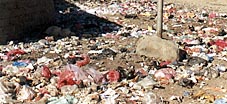
Pesticides & Plastic Bags: A Menace to Society and Environment [Archives:1999/22/Health]
May 31 1999
The problem of pollution and environmental degradation has become one of the major headaches and alarming issues of modern times. There is a worldwide warning of the hazards of pollution for human life. If the problem persists, our habitat may no longer support life.
This has become one of the crucial and challenging issues of the 21st century. We should be preoccupied with the issue and the need to protect the environment.
One of the major reasons why people don’t care about pollution is that they think of it as something unrelated to their life, probably because of their ignorance and lack of environmental education. They forget that we all share responsibility for preserving a good and healthy atmosphere for the sake of our world. Moreover, they disregard the fact that diseases that spread to everyone are a result of environmental degradation.

Pesticides
The use of pesticides started in 900 BC in China. But the dangerous levels of use of chemical pesticides only started in 1925. There are, of course, different kinds of pesticides like Aldrin, DDT, Lindane, Eldin, Dieldrin, Heptachlor and many others. But the most detrimental of these is DDT.
DDT was discovered in 1939 and was prohibited in 1970. Unfortunately, it is still used in Yemen even today.
We all know that qat-chewing is the most common habit of most of the Yemeni people. Therefore, the use of pesticides and insecticides to make the qat-plant grow very rapidly means that a very large percentage of Yemenis are exposed to insecticides by qat chewers. Most of the Yemenis suffering from cancer are qat addicts, and these who eat many spicy dishes.
Another point is that the use of pesticides and insecticides is the main reason behind some other diseases like paralysis. It is not only in qat growing that pesticides are used. They are also used in growing fruits, vegetables and even grains. This means that the life of the whole society is menaced.
There are alternatives that can be used instead. The winner of this year’s Hayel Saeed Award for Sciences and Arts discussed this critical issue. He discovered alternatives. He found that a kind of plant can be used to kill insects which are harmful to our plants. Actually, he has done something laudable – he has shown with experiments how it works. I wish the conference held in Sana’a during the period 14-16 March could have given more attention to this matter.
Plastic Bags
Plastic is one of the scientific revolutions of the 20th century. But the misuse of this product can be of considerable detriment to human beings and our habitat. Yemen has a large number of plastic factories spread all over the country. There are 20 that have been licensed, but many more are operational. In Sana’a alone, there are some thirty such clandestine factories.
Estimates indicate that volume of plastic products produced in Yemen during 1992-1996 was 25,842 tons. The government issued two ministerial decrees – one in 1994 and the second in 1998, to specify standards for plastic production. They both stipulated that imported and locally produced plastic bags whose length is less than 60 microns (now 20 microns) should be banned. These stipulations resulted in angry protests from the ‘industrialists’.
They were very annoyed and disturbed. Thus, the two decrees were no longer enforced. This is because the concerned authorities do not work together or help each other to follow implementation of the issued decrees.
The main problem is the misuse of the plastic bags. People are not aware of the many dangers of this material. All over the world, used plastic bags are returned for re-manufacturing or re-cycling. But here in Yemen they are thrown way. This is why we see these plastic bags flying in all directions. Thus, they deface the beauty of our cities, villages, and landscape.
They sometimes get stuck to trees. What is more horrible is burning them, because we all know that plastics don’t vanish by burning. On the contrary, they become a solid substance while emitting a suffocating smoke that causes a lot of respiratory diseases.
If buried or mixed in the soil, they prevent rainwater from seeping into the depths of the earth to feed the underground reservoirs. The water remains on the earth surface, and later evaporates. Even the plants do not get enough water for their growth, since plastic does not dissolve into the earth.
Another problem is that some of our animals – such as goats and sheep now feed on these plastic bags. When these animals are sold for slaughter, the plastic somehow makes its way to human intestines.
Yet, another problem with plastic bags is that they are used for wrapping food, which is rather dangerous. When the food is kept hot in a plastic bag, it becomes mixed with the substance of the plastic which causes a lot of diseases.
Therefore, there is no way out except for banning the production of this menacing material. They are already banned worldwide.
Besides, there are alternatives. The paper and reed bags are safer in the sense that they can be easily dissolved into the soil without any harm.
People have to be educated on the detriments of plastic bags. Is there somebody listening?
Mohammed Hatem Al-Qadhi
Taiz Editor, Yemen Times
——
[archive-e:22-v:1999-y:1999-d:1999-05-31-p:./1999/iss22/health.htm]


